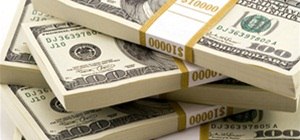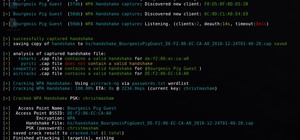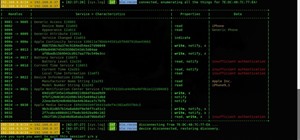I'm pretty sure that it's a universal dream for everyone in the world to retire early. Who wants to to be stuck with the rest of the country and retire when you're almost 70 years old? You heard me right, 70! Most people can't go out and do the things they love to do by the time they're 70, unless they've been practicing good health and exercise their entire life.
Not only this, but with the way the economy is, who's to say that there will even be social security by the time this generation retires? This very well may be a bleak reality that we all must face. So why not manipulate the banks to our advantage and make ourselves rich? You can actually do this on nearly any budget.
For today's Null Byte, I will be teaching you how you can effectively use CDs, or Certificate of Desposits to your advantage. Even with the economy the way it is, with CDs at really low rates, it's possible to have a $500,000+ retirement, without even getting social security. Nevermind the fact that we can retire years earlier.
Requirements
- $10,000 to start (less if you don't have enough, but $10,000 makes this very easy)
- Self discipline to save and not touch your money until you've reached retirement age
Step 1 Getting What We Need
In order to do this, we need a nice chunk of $10,000 dollars. For an early retirement, this is an incredibly small amount of money to invest to ensure a great future. Say you work at McDonalds, you can gross $250 a week, which comes out to $1,000 a month.
Let's Calculate Some Bills
If you subtract average rent from this for a one bedroom or studio (depending on location), that's $500 subtracted, which is a generous amount. Add the price of food (though, if you make that level of salary, you do qualify for food benefits from the government) and you will only need to spend another $100. Most apartments include utilities, so that's only about $20 for electricity, and $100 for internet and phone. Add in another $10 for self care products. This leaves you with $270 dollars a month profit. That's just 3 years to save the money that you need. This, of course, assumes that you have no other fees.
With most people living with another wage earner (roommate or spouse), and not working at McDonalds, you're likely to be able to acquire $10,000 way sooner.
Step 2 The Rest of the Math
The theory behind this is simple. Start with your $10,000 dollars, and go to a bank that offers a decent interest CD. Preferably 5% or greater. This is easy. The longer the saving length of the CD, the higher the interest will be. Get the highest interest and longest term CD possible.
After just one year of $10,000 sitting in the bank at 5% APR, you end up with $10,512.67. In order for us to exploit this to the maximum extent, we need continue to add $1,000 dollars to this every year. This is easily done on any budget.
After 30 years with daily compounding interest, you end up with $179,249.15. That's $139,249.15. If you can afford to invest more, which most people could, you can easily boost yourself up to $500,000. This is a bad CD to be honest. I've seen programs through Chase offering 10% APR. You could be a millionaire before you're 55. Even still... Look at the return you get for only $40,000 dollars.
However, this isn't the most effective way to an early retirement. Stay tuned on Null Byte for an upcoming guide to investing into something a bit more risky, but with returns that can nab you millions and a very early retirement. Coming soon: Tax lien investments.
Want more Null Byte?
Just updated your iPhone? You'll find new emoji, enhanced security, podcast transcripts, Apple Cash virtual numbers, and other useful features. There are even new additions hidden within Safari. Find out what's new and changed on your iPhone with the iOS 17.4 update.
























20 Comments
This is relevant to my interests.
Cool article! I invest quite a bit in stocks, want me to do a tutorial on that?
yes, I'd be curious to read that.
I would love to read a post on that as well :). I've not invested in stocks before.
Pick stable, low risk company, invest, get paid dividends.
Otherwise investing in stock can be quite risky, especially if you invest more than you can afford to lose. The allure of high payout for short term investment is attractive of course, but the fact that you might lose a lot of money hits like a ton of bricks. Unless you were in trading before, I would not suggest mimicking the wall street kids. They invest someone else's cash (as you may know) and the risk is not theirs. Albeit it still has consequences if they screw up badly.
Yeah, tax liens are almost risk-free, so I'll stick with investing in those. If I were to invest in stock, it'd probably be with someone stable like 3M...but the returns would be so slow and gradual, that it wouldn't be worth the headache :(.
well, ive been investing for about too years now, and haven't got burned too badly yet (knock on wood). I usually look for patterns, randomness, and trends from past exchanges. Looking for abnormalities in averages. For example, this stock http://www.google.com/finance?cid=707061 was down at around 60 cents on Dec 14, then recovered 40 cents in the last month. If you observe the stock's history, there are quite a few little "blips" that follow the same pattern. This is where the risk comes in; to either trust history, or trust present data. I find stock history works about 70 percent of the time, a risk worth taking, in my opinion. The idea is to have multiple stocks with the same patters and categories, because they tend to follow each other, in an ideal situation.
Or.... Get a job as a trader, invest other people's money and earn from a minimum of 200k per annum for taking risks! Seriously, after derivatives were introduced, you can bet on pretty much anything... From the likelihood of JP Morgan going under to the chances of a volcanic erruption crippling the local economy in the mediterranean.. Well that's a hyperbole, but the point is, it's a high risk - high pay environment which (and I've been a witness to this) makes some people off themselves if they lose...
um.. so yeah... I'll just leave this here.
This is very interesting, but if a person makes 100,000$ a year, would this method be as profitable?
Or would it be more prudent to invest a exponentially increasing amount of money?
Just curious.
I think my next post on tax liens would be more profitable for someone making that much money :).
100k, is 8,333k p/m. That's a lot of money you can save right there assuming the conditions are right. Just fire up a spreadsheet and crunch the numbers. It's really easy.
MMMmmm compound interest. It does grow pretty well given a large enough starting sum.
;D. Also, why are you not in IRC, my good man?
'Cus nobody talks to me QQ…
Nah, I just go on whenever I'm not doing anything, otherwise I get distracted. I'm usually doing something.
These days you'll be lucky to find a 1 year CD with rates above 1%.
the highest cd i found from chase is 2% and thats 120 months
Wow, stuffs really gone down hill with them. BOA offers 1.75 percent, and on a 10 year CD at my credit union, they offer 4%. I wonder how my credit union could afford to go higher? Is this the same for anyone else?
highest ive found was like 2.51 but it was 10 yrs and minimum deposit of 100,000...
Big difference between 10 years & 1. 10 years for only 4% is just 0.4% / year.
This is based on completely implausible assumptions and incredibly faulty math. No one is getting a 10% CD rate, and you need to find an amazing bank and have a lot more than $10,000 to get anything close to 5%.
However, let's assume that you are 25, have $10,000 to invest in CDs and miraculously find one with a 10% rate. Let's also assume that you follow this advice and invest an additional $1000 annually at this rate. Now, given compounding interest at 10% APR for 30 years, when you reach 55 you will have approximately $379,232.
This is a pretty decent chunk of changes, but this strategy is not going to make you a millionaire by the time your 55. However, given the scenario above continued for an additional 15 years (to the retirement age of 70) the magic of compounding interest will take your nest egg up to $1,730,732.
So, the lesson here is start your retirement savings early and you can end up a millionaire, for whatever that's worth in 45 years.
Share Your Thoughts